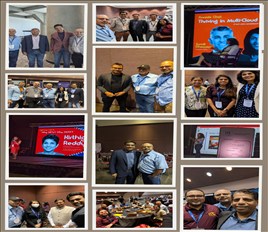We had a wonderful fireside chat with Rophin and Preetha as part of the ASEI MentorConnect program on Saturday, Aug 27, 2022.
Divya Ashok, VP of Strategy and Innovation at Salesforce kicked off the meeting by sharing the vision of ASEI and its programs. She shared details about MentorConnect as one of the four focus programs of ASEI, which serves as a platform to connect its members to help each other as both mentors and mentees in their professional success.
Today’s panelists included Rophin Paul and Preetha Ram. Rophin is the CEO of Wipro Pari Robotics, USA, a company that works with key automotive partners in providing manufacturing automation. Preetha is a member of the ASEI National Board and also a VC, Educator, and Entrepreneur. Both have a passion for travel to Europe – Rophin to get close to nature and Preetha for its history, food, and culture.
Here are a few highlights from the chat:
What is one lesson learned in the context of leadership and mentoring based on varied experiences?
Rophin: Integrity is at the absolute top of the list and shows how you work with and uphold the team. It often comes into play when you are pressured
Preetha: Creating an inclusive space is a key observation. This helps bring the conversations open and helpful
On how culture plays a role in mentoring.
Rophin: Culture plays an important role based on Eastern or Western origins. Eastern culture emphasizes the leader and mentor as the sage. One follows the leader for their deep experience and insights learned – more as followers. Western culture is based more on being open and communicating. Many questions from the mentees are very relevant and the relationship is successful when there is openness and learning in both directions.
There is an element of match-making between the mentor and mentee. What makes for a good relationship?
Rophin: Map your values and your goals from both mentor and mentee perspectives. Try to get alignment in 3 or 4 and that will work well. The alignment of goals between the mentor and mentee is the most effective method for a good relationship. If in the first couple of meetings, you don’t get that alignment, it’s okay to move on and look for a different mentor/mentee.
Preetha: Make a 3-point set of goals and get an agreement at your first meeting. At the end of a relationship, this will help to understand if the mentoring relationship was successful.
Is any time too early to be a mentor?
Rophin: Some leaders tend to naturally influence like a captain without actually being called a mentor. It is never too soon to take an active role and help someone else.
Preetha: Peer-to-peer mentoring can work very well if the mentor-mentee goals are matched.
How do you deal with a leader you do not agree with in a corporate setting?
Rophin: Disagree politely, articulate your position, and lay the facts out there. If there is still disagreement, you have to go with the leader if they are the decision maker – don’t get emotional. If you are the decision maker, let your values guide you.
How do we work with people that don’t report to you and still solve difficult issues?
Rophin: First align people to the problem, either the business or a bigger picture issue. Put yourself in their shoes and understand that they might have unique problems themselves. Play the role of understanding both sides.
What sort of difficulties do mentors face?
Rophin and Preetha: The mentee is not stepping up and taking actions to recommend. Articulating that delicately is important. It sometimes gets trickier if it is across teams. Sometimes mentees do not show up for a meeting or cancel at the last moment: both parties need to understand and respect each other’s time. Another challenging situation is when mentee does not articulate their goals well – this is when some time needs to be spent on alignment and clarification.
Any take on small-group mentoring v/s 1-1 mentoring?
Rophin and Preetha: Both have their space. Small group mentoring is more generic advice. It also creates a bonding between the mentees. It is very effective for entry-level employees. It is almost like coaching as you are broadcasting and creating high-level goals. 1-1 mentoring is targeted for career goals and personal development. When the mentee’s success becomes the mentor’s success that will provide the best outcomes.
Read the insider scoop and key takeaways in this candid blog by ASEI President Piyush Malik


